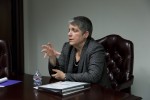University of California President Janet Napolitano said Tuesday that UC tuition may continue to rise with inflation, depending on how the state funds the UC in the future.
Napolitano said in an interview with the Daily Bruin Editorial Board on Tuesday the regents will consider increasing tuition by 2.5 percent in 2018. However, she added 57 percent of California undergraduate students pay no tuition or fees and another 20 percent receive significant financial aid.
“Whether we are looking at tuition increase ad infinitum is really dependent on whether the state puts in the money,” she said.
During the interview, Napolitano discussed the university’s support for undocumented students, a Board of Regents investigation that found the UC Office of the President improperly interfered in a California state audit, and sexual harassment allegations against Regent Norman Pattiz, among other topics.
Napolitano said that although public universities have historically only depended on tuition and state funding for revenue, the UC is also looking into other revenue sources, including charitable giving and funding from online certificate courses and master’s degrees.
DACA
President Donald Trump ended the Deferred Action for Childhood Arrivals program, which former President Barack Obama enacted in 2012. The program deferred deportation for undocumented individuals brought to the United States as children. The UC, which has about 4,000 undocumented students, sued the Department of Homeland Security in September for ending the program.
Napolitano said the United States District Court in San Francisco will hear oral arguments for the DACA lawsuit Dec. 20.
“That will be likely our first substantive judicial ruling on our claims,” she said. “I anticipate the judge will rule relatively quickly to allow whichever side loses to appeal.”
The UC provides free legal services to DACA students and will continue to fund activities and student centers for undocumented students regardless of what happens to the program, she added.
Sexual harassment allegations against Regent Norman Pattiz
Napolitano said that although students have called on Pattiz to resign due to sexual harassment allegations against him, she thinks it is up to the regents to resolve those claims. She added the board has changed its policies to require regents take harassment training and that Pattiz has done so.
“The relationship between regents and students should be one of respect for the roles each play in different university communities,” she said. “That mutual respect should be reflected in the exchanges between regents and students, and I’ll just leave it at that.”
Free speech
Napolitano said she thinks the University should pay security costs for controversial speakers, even if such costs are expensive.
“Can a university not invite speakers or not approve their invitations on the grounds that we simply can’t afford it? … That is an untested principle in the law,” she said. “Right now, we have chosen not to raise those challenges but simply to pay for the cost.”
She added the UC’s free speech center, announced in October, will research how students understand the First Amendment and shape university curricula on free speech issues. She added many UC students do not think the First Amendment protects hate speech, even though it is constitutionally protected.
“The national level of debate on these issues is very important and we have an important contribution to make,” she said.
Federal tax bill
Napolitano said the UC is concerned about aspects of a tax bill that passed the House of Representatives last month, including a provision that would treat graduate students’ tuition waivers as taxable income. The Senate version of the bill does not include that provision. She added she is concerned that the tax bill disincentivizes charitable giving, which may impact the revenue the UC generates from donations.
UCOP is lobbying Congressional officials through letters, personal visits and the UC Advocacy Network, a group of students and alumni that send letters and emails to policymakers, she said.
“The provisions that directly affect students are our top concern,” Napolitano said. “The tuition waiver is probably the top of that list.”
Napolitano said the university might consider increasing graduate students’ salaries to counteract the effects of the tax bill, but the costs of such wage increases would be substantial.
Regents investigation on state audit interference
A regents investigation released last month found that UCOP improperly interfered in California state auditor surveys that sought independent perspectives from campuses about the quality and cost of UCOP services. Napolitano approved a plan for campuses to send survey responses to UCOP before submitting them to the state auditor.
“I acknowledge and apologize for and regret what happened there,” Napolitano said. “I adopted a plan for us to coordinate responses – that was a mistake.”
Napolitano added she thinks UCOP will make its budget more transparent by implementing the state audit recommendations.
Napolitano said she has had conversations with chancellors discussing the investigation’s findings and will continue to meet with them to receive their input.
“I appreciate the role chancellors play,” she said. “It’s very important we have a good working relationship and friendship.”
